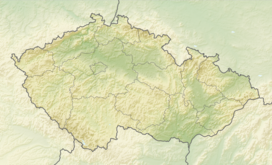Stránská skála
| Stránská skála | |
|---|---|
| Paleontological site | |

Toppath on Stránská skála
|
|
| Highest point | |
| Elevation | 255–310 m (837–1,017 ft) |
| Coordinates | 49°11′26.05″N 16°40′32.66″E / 49.1905694°N 16.6757389°ECoordinates: 49°11′26.05″N 16°40′32.66″E / 49.1905694°N 16.6757389°E |
| Dimensions | |
| Area | 136 acres (55 ha) |
| Geography | |
|
|
|
| Location | Czech Republic—Moravia |
| Parent range | Brno Highlands |
| Geology | |
| Age of rock | |
Stránská skála (often without diacritics as Stranska skala) is a hill and refers to a -Cromerian interglacial most important paleontological site in Central Europe. It is situated in the eastern part of Brno, Moravia near the city districts Židenice/Juliánov and Slatina, dating to approximately 600,000 BP, as supported by paleomagnetic dating. It is a 1500 m long and 400 m wide hill, built from Jurassic limestone, especially Callovian-Oxfordian, built from light brown Caleidocrinus (Crinoid) mostly and Brachiopoddes and Coral and more other types of limestones rich of fossil fauna as well. Stránská skála hill is located in Bohemian Massif (and right on the border between the two geological provinces): Bohemian Massif (Moravian Karst) and Carpates (Western Subcarpathia- Dyje-Svratka Vale). Its northwestern slope is composed from karstified limestone cliffs in which numerous fossiliferous fissures and caves were found. Approximately 48 meter of this slope are covered by complex talus fan.
...
Wikipedia

